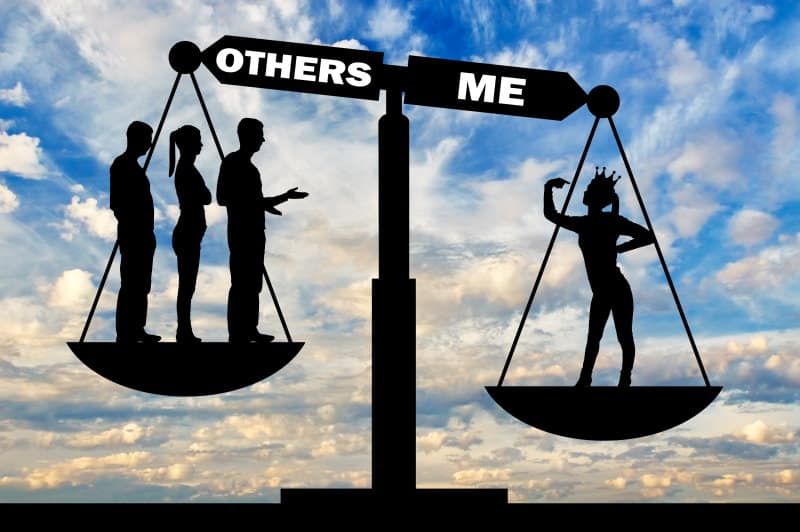Relationship Redux: Do Narcissists Follow The Same Patterns With Everyone?
*We may earn a commission for purchases made using our links. Please see our disclosure to learn more.
Narcissism is a demanding and difficult psychiatric disorder, and we see it perhaps more often than we might expect among our friends, family, and romantic partners. It can be confronted only when understood. To better understand it, read this post on how narcissism develops.
With regard to intimate relationships, in particular, narcissism can take its toll. If you suspect that you are in a relationship with a narcissist, you should be aware that there are specific and consistent patterns that most, if not all, narcissists follow when engaging with others.
Note the following warning signs of how narcissists operate in a relationship.
Portrait of a Narcissist
First, recognizing narcissistic behavior is key to learning how to deal with it. Narcissists hide a deep-seated sense of insecurity and lack of self-esteem behind a façade of self-aggrandizing behavior and a pathological need for attention.
They have an inflated sense of their own importance and become very adept at self-promotion while having little regard for the feelings of others. Narcissists are the center of their self-generated universe.
When narcissists pursue relationships, the pattern is consistent. Check out this post for 7 signs you might be dating a narcissist. Initially, they will idealize the relationship with grand and sweeping sentiments.
Once the exciting phase of the relationship has passed, they will devalue the relationship—and the other person—with cutting and demeaning criticisms combined with statements of their own superiority.
Finally, they will grow tired of the relationship and move to discard their former lover, while rarely taking any responsibility for the failed union.
Stage One: Narcissistic Romance
In the first stage, a narcissist will often appear as a romantic and passionate partner, engaging in grand gestures and bold proclamations of love. They might use language such as “soul mate” and invoke fate to imply that you were meant to be together.
They will often isolate you from your other friends and family, insinuating themselves into the forefront of your life. They want you all to themselves.
Their intention, typically speaking, is to reel you into a relationship in which they will ultimately be allowed to control and dominate. They need to be the center not just of their own universe but also of yours.
Stage Two: Demean
Once you are fully invested in the relationship, the narcissist will slowly but certainly move into the second stage of the pattern, devaluing not only the relationship but also demeaning you.
It usually begins subtly, with statements that suggest that the narcissist is better at whatever activity you might be accustomed to doing together (“Look, just let me handle the cooking. You know I’ve had more practice.”) or simply smarter and superior in general.

In this stage, the narcissist will ensure that you feel at fault for whatever is wrong: “It’s not a surprise that not many people like you”; “quit being so insecure”; “stop whining and crying; I won’t let you manipulate me.” Turning the blame back onto you is a surefire way to undermine your self-esteem and confidence. This lets them maintain even greater control within the relationship.
In addition, at this stage, narcissists will begin to explain away their behavior with a number of excuses designed to elicit your sympathy and your forgiveness so that you remain subjugated to their domineering ways.
They might blame their parents and upbringing for their often cruel behavior, or claim that an ex-partner was unfaithful or vindictive, or simply emphasize that relationships are difficult and you should just accept that there will be unpleasant moments.
Again, a hallmark of this behavior is to make certain that the narcissist takes no responsibility for the actions or statements. The blame lands squarely elsewhere—bad parenting, unhealthy past relationships, the complications of love—though it will often land directly on you.
The narcissist will predictably accuse you of engaging in the very behaviors they exhibit, such as selfishness, carelessness, or lacking in attentiveness. They might also explain away their actions by saying that they “have a problem,” that they “can’t control” themselves. This is merely another way of deflecting any responsibility for their hurtful words.
Stage Three: Devalue
In this stage, narcissists will also be sure to devalue anything and everything that you might enjoy or love. They will begin to insult your interests, demean your choices, and even launch outright attacks on other people in your life. For example, they might say something like “why would anyone want to watch that stupid show?” or “you actually enjoy doing yoga? That’s crazy.”
They will become aggressively protective of your time and attention, discouraging you from seeing your friends or family. Often, they will suggest that your other friends are not good enough for you or that they don’t really have your best interest at heart. The more narcissists are able to isolate you, the more control they can exert over you.
Narcissists like to assert their authority and will begin to mold you to their expectations and desires. They will start telling you how to look, what to wear, how to behave. Their opinion and taste is clearly superior, in their eyes, and you are merely an extension of their needs. The narcissist wants you to lose all sense of your own autonomy, so that they can manipulate you to fulfill their hollow heart.
Stage Four: Deflect and Discard
Finally, in the last stage of the relationship, narcissists will begin to grow tired of you—often because they have broken you down so much that you no longer resemble the person they thought they loved in the first place.
Yet, since nothing is ever the narcissist’s fault, the process of discarding you is one in which they again turn the tables against you: “It’s impossible to love you” or “you realize this is all your fault” or “how can I continue to love such a terrible person?” The narcissist’s words and actions become increasingly abusive over time.
Final Thoughts
It is important to recognize that you are not to blame for the narcissist’s behavior. It is equally important to understand that you cannot fix or change them.
Once you begin to identify the signature patterns of narcissistic behavior, the only positive action you can take is to extricate yourself from the relationship. Most narcissists do not change—this is one of the defining features of narcissism, not to acknowledge the condition—so you must be vigilant and confident in your own self-worth.
Now that you know a little more about the patterns narcissists follow in any relationship, you might need to know more about what to do if you decide to end a relationship with your narcissistic spouse. Check out this blog post with 7 tips for divorcing a narcissistic husband.
--
If you want more tips for dealing with narcissists, setting boundaries, and managing emotional triggers, make sure you subscribe to my youtube channel




